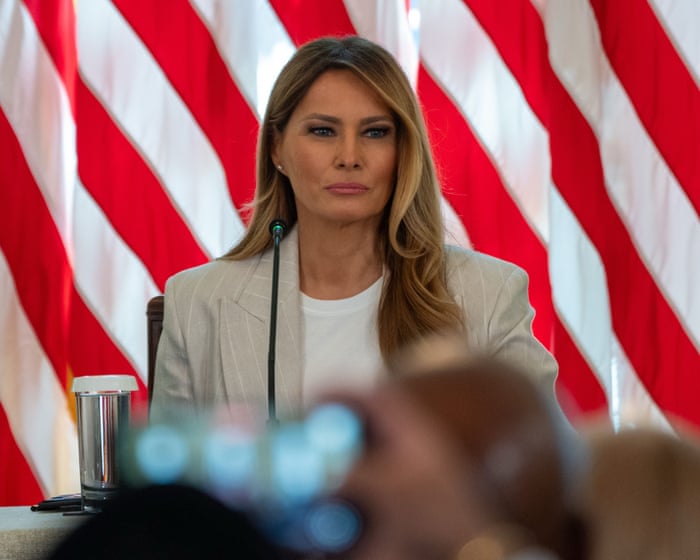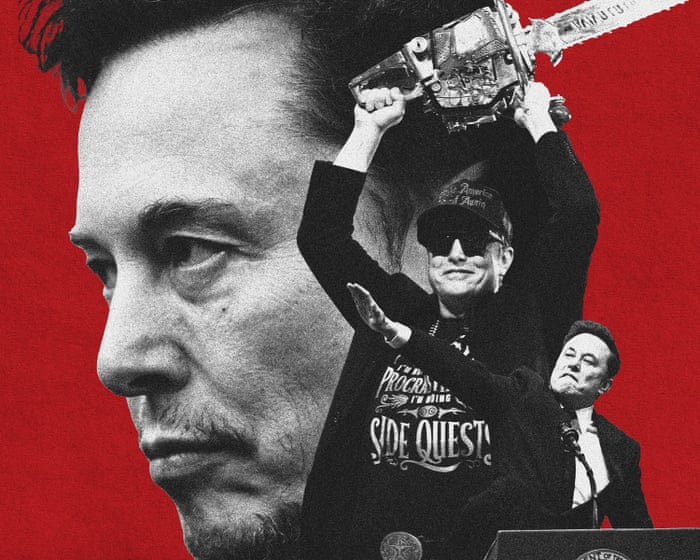MelanAI is coming for your kids.
“The robots are here,” Melania Trump announced at an AI event at the White House on Thursday. It can be hard to read the first lady’s expressionless face and monotone voice, but this didn’t sound like a statement of regret. Instead, reading from a script in a very analog binder, she took it upon herself to guide America’s children through the world of AI, which she called the “greatest engine of progress in the history of the United States.”
“As leaders and parents, we must manage AI’s growth responsibly,” she said in her speech. “During this early stage, it is our duty to treat AI as we would our own children.”
Does that mean handing them off to a nanny or, as Donald Trump once did with Donald Trump Jr., leaving them at the airport for being five minutes late? Apparently not—it means “empowering, but with watchful guidance.”
Melania Trump doesn’t spend much time at the White House. The first lady has made it clear she isn’t bound by “duty” or “tradition” like her predecessors. She does what she wants, when she wants. Thursday’s AI roundtable is the latest sign that she wants to be seen as a leader in technology’s future. Like the rest of her family, she has enthusiastically embraced NFTs and cryptocurrency—and their ability to quickly generate enormous wealth for the Trumps. She has also boasted about using an AI version of her voice to narrate the audiobook of her memoir, “Melania.” Last month, she launched an AI contest for kids in grades K–12.
The first lady isn’t just trying to be a leading voice in tech—she’s also branding herself as the face of responsible innovation. When announcing her AI contest for kids, for example, she highlighted her support for the Take It Down Act (TDA), saying she “championed online safety” through it. It’s true that Melania advocated for the TDA, which passed Congress with bipartisan support earlier this year and criminalizes the nonconsensual sharing of intimate images (once known as “revenge porn”). However, the law is more complicated than she suggests.
Image-based sexual abuse—whether involving real or AI-generated content—is a serious issue that scholars and activists have long worked to address through legislation. While it’s commendable that Melania got involved with the TDA, some believe she stepped in at the last minute to attach her name to a heavily altered version of a model statute developed by experts. Many civil rights activists warn that the TDA has been broadened so much that it could be used to suppress free speech.
“I am gratified that the [TDA] incorporates much of the language of the model federal statute against nonconsensual intimate imagery that I first drafted in 2013,” wrote Dr. Mary Anne Franks, president of the Cyber Civil Rights Initiative, in a statement earlier this year. “But the Take It Down Act also includes a poison pill: an extremely broad takedown provision that will likely end up hurting victims more than it helps.”
The Electronic Frontier Foundation has similarly warned that the TDA is so broad it gives “the powerful a dangerous new way to pressure platforms into removing lawful speech they simply don’t like.” In fact, the president himself has hinted at this, telling a joint session of Congress, “I’m going to use that bill for myself too if you don’t mind, because nobody gets treated worse than I do online, nobody.”
All of which is to say: Melania Trump may not be the best person to responsibly manage AI’s growth and protect children from its potential harms. But if she’s serious about this work, perhaps she should stop forming task forces on integrating AI into childhood education and simply ask hMelania Trump should urge her husband to stop undermining public education. For instance, the Trump administration is trying to cut funding for Head Start, a federal program that supports early childhood education for low-income families, and has ended a grant program that historically funded educational children’s shows like Sesame Street. The administration is also working to limit education about slavery, and Republicans are pushing to remove criticism of Israel from Wikipedia. More broadly, book bans and censorship are on the rise under Trump.
Melania is correct that AI is here to stay, but I doubt the Trump administration will integrate it into schools in a way that promotes equity or expands knowledge. Instead, I suspect these AI task forces will mainly funnel taxpayer money to tech CEOs who have been courting Trump. As Christopher Hinton, often called the “godfather of AI,” told the Financial Times, AI “will make a few people much richer and most people poorer”—which may explain why Melania and the billionaires and tech executives around her are so enthusiastic about it.
In other news, accused rapist Conor McGregor wants to be Ireland’s next president. He recently lost an appeal of a civil court ruling that awarded damages to a woman who accused him of rape, and he has had numerous other legal issues. Still, that doesn’t seem to be a barrier to high office these days. Elon Musk is enthusiastically backing McGregor’s bid.
A venture capitalist, Cindy Bi, went to extreme lengths to punish her surrogate after the baby died in utero. As Emi Nietfeld reported in Wired, surrogacy carries significant health risks that are often not disclosed. Bi later had a healthy baby via another surrogate, who required an emergency hysterectomy. While surrogacy has been normalized by celebrities, this story highlights the ethical concerns of the for-profit surrogacy industry.
Epstein’s victims have announced they will compile their own confidential list of individuals regularly involved in his world. “We know the names,” one survivor stated at a press conference.
RFK Jr. has hinted that access to the abortion pill could be restricted, despite overwhelming evidence that mifepristone and misoprostol are safe and effective. Meanwhile, Texas has passed a bill banning the mailing of abortion pills to the state.
Far-right Trump confidante and self-described “proud Islamophobe” Laura Loomer recently used her influence to push the administration to block medical visas for sick children from Gaza, arguing that Palestinian children are not innocent.By labeling Palestinian children as terrorists, Loomer dehumanizes them. On her podcast, she asked, “You think these kids are so innocent? You think little kids are not capable of evil?” In reality, the true terrorists may be those responsible for creating the world’s largest number of child amputees and systematically starving infants to death.
Google is also implicated, with a reported $45 million contract to spread Israeli propaganda. According to Dropsite News, Google plays a key role in supporting Netanyahu’s messaging and amplifying misinformation about the famine in Gaza, contributing to dehumanizing narratives that fuel genocide.
In lighter news, a raccoon in Kentucky apparently overindulged on fermented peaches discarded by a distillery and passed out in a dumpster puddle. A nurse passing by performed compression-only CPR until the little guy came to. Kentucky Mist Distillery, which makes peach-flavored moonshine, shared a video of the rescue with a reminder: “PLEASE, DRINK RESPONSIBLY!!” That raccoon probably learned the hard way that binging on fermented dumpster peaches is risky business.
Frequently Asked Questions
Of course Here is a list of FAQs about the topic framed around the perspective of Arwa Mahdawis critique of Melania Trumps stance on automation
General Beginner Questions
Q What is the main point of Arwa Mahdawis article
A That while Melania Trump is right that automation is a real issue her proposed solutionfocusing only on teaching children good manners and social media etiquetteis completely inadequate for the massive economic and social changes automation will bring
Q What does automation mean in this context
A It refers to the use of technology robots and artificial intelligence to perform tasks that were previously done by humans potentially leading to widespread job losses in various industries
Q What was Melania Trumps suggested approach to dealing with automation
A She emphasized teaching children the importance of positive social emotional and behavioral skills to prepare them for the future which critics saw as overly simplistic
Q Why do critics say her approach is misguided
A Because it treats automation as a personal social problem rather than a largescale economic one Solving it requires systemic solutions like policy changes education reform for tech skills and social safety nets not just better manners
Advanced Critical Thinking Questions
Q What kind of solutions does Mahdawi likely believe are necessary if not Melanias
A Broader governmentled initiatives such as investing in STEM education considering policies like Universal Basic Income providing retraining programs for displaced workers and regulating how automation is implemented
Q Is the debate just about education
A No its deeper Its about whether we see technological disruption as an individual responsibility to adapt or a collective societal challenge that requires structural and policybased answers
Q What is a common problem when leaders discuss automation
A They often focus on vague soft skills instead of concrete actionable plans to address job displacement wage stagnation and the need for new technical skills
Q Can you give an example of a more comprehensive approach to automation
A Countries like Finland and Singapore have experimented with national strategies that include digital literacy curricula in schools statefunded adult education programs and research into the social impact of AI going far beyond individual etiquette



